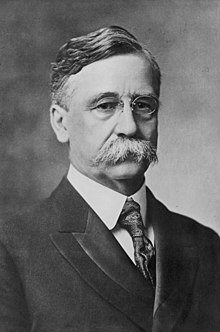William Paul Dillingham | |
|---|---|
 | |
| United States Senator from Vermont | |
| In office October 18, 1900[1] – July 12, 1923 | |
| Preceded by | Jonathan Ross |
| Succeeded by | Porter H. Dale |
| 42nd Governor of Vermont | |
| In office October 4, 1888 – October 2, 1890 | |
| Lieutenant | Urban A. Woodbury |
| Preceded by | Ebenezer J. Ormsbee |
| Succeeded by | Carroll S. Page |
| Vermont Commissioner of Taxes | |
| In office December 1, 1882 – October 3, 1888 | |
| Preceded by | None (position created) |
| Succeeded by | James Loren Martin |
| Member of the Vermont Senate from Washington County | |
| In office 1878–1882 Serving with Albert Dwinell | |
| Preceded by | Eliakim Persons Walton Ira Richardson |
| Succeeded by | Willard S. Martin Edwin K. Jones |
| Member of the Vermont House of Representatives from Waterbury | |
| In office 1884–1886 | |
| Preceded by | George W. Randall |
| Succeeded by | George E. Moody |
| In office 1876–1878 | |
| Preceded by | John B. Parker |
| Succeeded by | Leander H. Haines |
| Personal details | |
| Born | December 12, 1843 Waterbury, Vermont |
| Died | July 12, 1923 (aged 79) Montpelier, Vermont |
| Political party | Republican |
| Spouse | Mary E. Shipman (1846 -- 1893) |
| Relations | Paul Dillingham (father) Matthew H. Carpenter (brother in law) |
| Profession | Lawyer |
William Paul Dillingham (December 12, 1843 – July 12, 1923) was an American attorney and politician from the state of Vermont. A Republican and the son of Congressman and Governor Paul Dillingham, William P. Dillingham served as governor from 1888 to 1890 and United States Senator from 1900 until his death.
Dillingham was born in Waterbury, Vermont, in 1843, and attended schools in Vermont and New Hampshire. He studied law with his brother in law, Matthew Hale Carpenter, attained admission to the bar, and practiced in Waterbury and Montpelier.
Groomed for a political career from an early age, Dillingham served as Secretary of Civil and Military Affairs (chief assistant to the governor) during his father's term and that of Asahel Peck, State's Attorney of Washington County, and member of the Vermont House of Representatives and Vermont State Senate. He was elected governor in 1888 and served one two-year term.
In 1900, Dillingham won election to the United States Senate, replacing Jonathan Ross, who had been appointed as a temporary replacement following the death of incumbent Justin Smith Morrill. Dillingham served in the Senate until his death, and was chairman of several committees during his tenure. As head of a commission that studied immigration, he argued that Eastern and Southern European immigrants posed a threat to the country's stability and growth, and that immigration from those areas should be curbed in the future.
Dillingham died in Montpelier in 1923 and was buried at Hope Cemetery in Waterbury.
- ^ Brown, John Howard (July 2006). The Cyclopedia Of American Biography V6: Comprising The Men And Women Of The United States Who Have Been Identified With The Growth Of The Nation. p. 552. ISBN 1161610650.